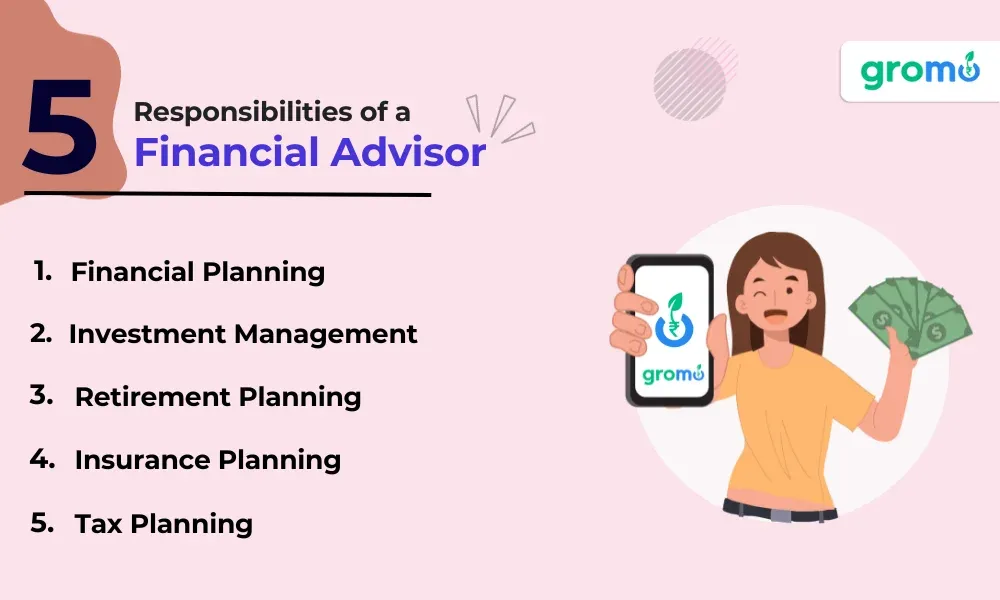How To Become a Financial Advisor
To achieve financial independence, financial planning and discipline are essential. And Financial Advisors help their clients with the same.

Navigating personal finances and investments can often be complex, which is why financial advisors play a vital role in guiding individuals toward financial stability and growth. A financial advisor offers expert advice on areas like investments, retirement planning, taxes, and wealth management, helping clients achieve their financial goals. With the growing need for financial literacy and planning in India, becoming a financial advisor is a promising career path with high demand, competitive earnings, and opportunities for growth.
This guide provides a detailed roadmap on how to become a financial advisor, the skills required, and the role platforms like GroMo can play in your journey.
What Is a Financial Advisor?
A financial advisor is a professional who provides tailored advice to individuals or businesses to manage their finances effectively. These advisors evaluate their clients’ financial goals, assess their current financial situation, and create actionable plans for achieving objectives like wealth accumulation, retirement security, and debt reduction.
They specialize in various aspects of finance, including investment strategies, risk management, tax optimization, and estate planning. Financial advisors may work independently or as part of larger financial institutions, offering personalized services based on their clients’ needs.
What Does a Financial Advisor Do?
Financial advisors play a multifaceted role in helping clients manage their finances. Some key responsibilities include:
- Investment Planning: Creating portfolios that align with the client’s financial goals and risk appetite.
- Debt Management: Assisting clients in reducing or eliminating debt through structured repayment strategies.
- Retirement Planning: Advising on how to build sufficient savings and choose the right retirement plans.
- Tax Optimization: Identifying ways to minimize tax liabilities and maximize savings.
- Wealth Protection: Recommending insurance products and other risk management strategies.
- Estate Planning: Helping clients ensure smooth wealth transfer through wills and trusts.

Why Pursue a Career as a Financial Advisor
Choosing to become a financial advisor offers several benefits, both professionally and personally:
- High Demand: With rising awareness about financial planning, the demand for advisors is growing rapidly in India.
- Lucrative Earnings: Financial advisors earn competitive salaries, with potential for additional income through commissions.
- Flexibility: Many advisors work independently, allowing flexibility in work hours and client selection.
- Impactful Work: Helping clients achieve financial security and independence can be deeply rewarding.
- Continuous Learning: Staying updated with financial trends and strategies ensures ongoing skill development and professional growth.
How Do You Become a Financial Advisor?
1. Educational Qualifications
To become a financial advisor, you typically need a bachelor’s degree in finance, economics, business, or a related field. Specialized certifications, such as Certified Financial Planner (CFP) or Chartered Financial Analyst (CFA), add credibility and expertise to your profile.
2. Licensing and Registration
In India, becoming a SEBI-registered investment advisor (RIA) is often necessary to offer financial advisory services legally. This involves clearing SEBI exams and adhering to regulatory guidelines.
3. On-the-Job Training
Gaining hands-on experience through internships or entry-level roles in financial institutions is essential for building practical skills and industry knowledge.
4. Networking and Client Acquisition
Building a professional network and cultivating client relationships are key to a successful career as a financial advisor.
Skills for Financial Advisors
1. Analytical Thinking
A financial advisor must analyze complex financial data, identify trends, and recommend suitable strategies for clients.
2. Communication Skills
Effective communication is vital to explain financial concepts and strategies clearly to clients.
3. Problem-Solving
Advisors must identify potential challenges in a client’s financial plan and propose actionable solutions.
4. Interpersonal Skills
Building trust and maintaining long-term relationships with clients require excellent interpersonal skills.
5. Technical Expertise
Proficiency in financial tools, software, and regulations is necessary to provide accurate advice and maintain compliance.
How to Become a Financial Advisor via GroMo?
GroMo provides a straightforward and accessible path for individuals aspiring to become financial advisors:
- Join GroMo: Sign up to partner with GroMo and start offering financial products like insurance, credit cards, and loans.
- Training Resources: Access expert training through GroMo Academy to build your skills and confidence.
- Zero Investment: Start your journey as a financial advisor without any upfront costs.
- Earn While You Learn: Begin earning commissions from referrals and sales while gaining hands-on experience.
How GroMo Can Help You Upskill Yourself?
GroMo is not just a platform but a comprehensive ecosystem for aspiring financial advisors:
- Product Training: Learn the ins and outs of various financial products.
- Sales and Marketing Support: Gain insights on how to pitch products effectively to clients.
- Technology-Driven Platform: Leverage GroMo’s tools to streamline your advisory services.
- Community Networking: Connect with experienced advisors and industry leaders for guidance and mentorship.
Services Offered By Financial Advisors in India
1. Investment Advisory
Providing tailored investment plans and portfolio management services to help clients grow their wealth.
2. Tax Planning
Advising clients on tax-saving strategies and investment instruments to minimize tax liabilities.
3. Retirement Planning
Creating comprehensive plans to ensure clients have sufficient funds for a secure retirement.
4. Insurance Planning
Recommending appropriate insurance products to protect clients from financial risks.
5. Wealth Transfer and Estate Planning
Helping clients prepare wills, trusts, and other legal structures for seamless wealth transfer.
Start Today
Becoming a financial advisor is a rewarding career choice that combines the opportunity to earn competitively with the satisfaction of making a tangible impact on people’s lives. Whether you’re starting fresh or looking to upskill, platforms like GroMo provide the resources and support needed to succeed. Join GroMo today to begin your journey and become a trusted partner in your clients’ financial growth.
FAQ about Financial Advisor
1. Difference between Financial Advisors vs. Financial Planners
The terms financial advisor and financial planner are often used interchangeably, but they have distinct roles:
- Financial Advisors: Offer a broad range of services, including investment advice, tax planning, and retirement strategies. They cater to diverse financial needs.
- Financial Planners: Focus on creating comprehensive financial plans, often addressing long-term goals like estate planning or retirement.
While both roles overlap, financial planners often specialize in long-term strategies, while advisors handle a mix of immediate and future-focused financial matters.
2. Do Financial Advisors Need a Master's Degree?
A master’s degree is not mandatory to become a financial advisor, but it can enhance career prospects. Most financial advisors begin with a bachelor’s degree in finance, economics, or business. However, advanced certifications like CFP or CFA hold more weight in the industry than a master’s degree. These certifications demonstrate specialized knowledge and credibility, which are crucial for building client trust.
3. How to Become a Successful GroMo Partner?
To become a successful GroMo partner, follow these steps:
Step 1: Sign up on the GroMo platform.
Step 2: Complete training via GroMo Academy to build expertise in financial products.
Step 3: Use GroMo’s digital tools to connect with potential clients and promote products effectively.
Step 4: Build relationships with clients by offering personalized financial solutions.
Step 5: Leverage GroMo’s referral programs to boost your income and grow your network.
4. What Is The Average Financial Advisor Income?
The income of a financial advisor varies based on factors like experience, location, and client base. On average:
Entry-Level Advisors: Earn around ₹3–5 lakhs annually.
Mid-Level Professionals: Earn ₹7–12 lakhs per year.
Experienced Advisors: Can earn upwards of ₹15–20 lakhs, especially in urban markets or with niche expertise.
Additional commissions from product sales and client referrals significantly enhance earning potential.





